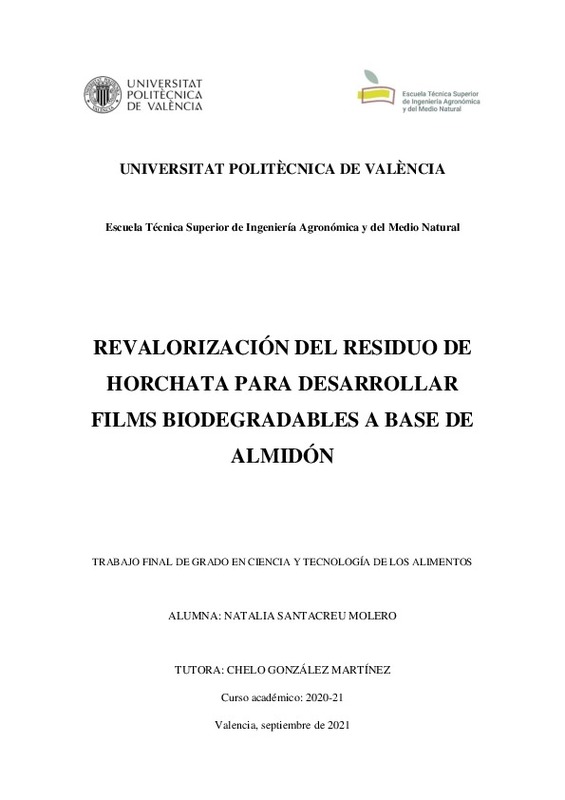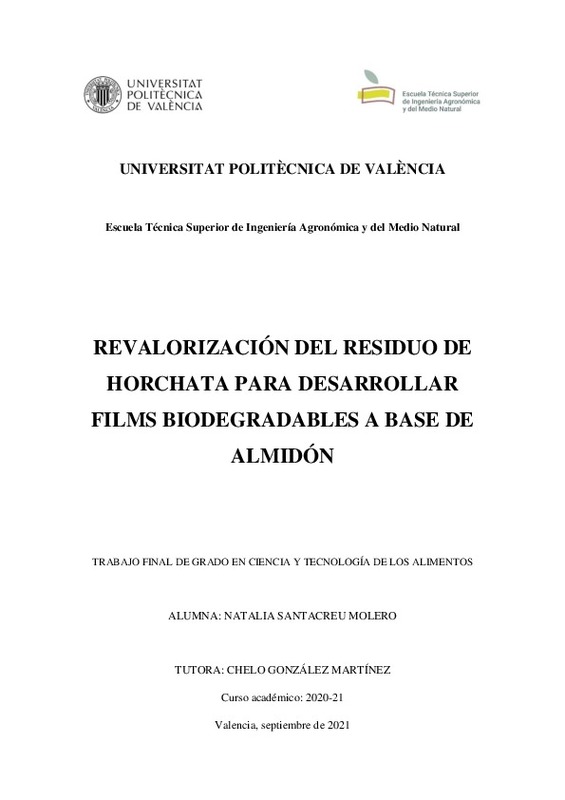JavaScript is disabled for your browser. Some features of this site may not work without it.
Buscar en RiuNet
Listar
Mi cuenta
Estadísticas
Ayuda RiuNet
Admin. UPV
Revalorización del residuo de horchata para desarrollar films biodegradables a base de almidón
Mostrar el registro sencillo del ítem
Ficheros en el ítem
| dc.contributor.advisor | González Martínez, María Consuelo
|
es_ES |
| dc.contributor.advisor | Contreras Monzón, Carolina Ivonne
|
es_ES |
| dc.contributor.author | Santacreu Molero, Natalia
|
es_ES |
| dc.date.accessioned | 2021-10-13T15:04:34Z | |
| dc.date.available | 2021-10-13T15:04:34Z | |
| dc.date.created | 2021-09-23 | |
| dc.date.issued | 2021-10-13 | es_ES |
| dc.identifier.uri | http://hdl.handle.net/10251/174622 | |
| dc.description.abstract | [ES] En línea con las recientes investigaciones en el aprovechamiento de subproductos vegetales enfocadas hacia la economía circular, en el presente trabajo se desarrollaron films a base de almidón de maíz y glicerol conteniendo 0 (control), 40, 50 y 60% de residuo de chufa obtenido tras la producción de la ¿horchata¿, junto con otra formulación con el 50% de dicho subproducto pregelatinizado (50:50G). De cada film, se caracterizó su humedad, espesor, permeabilidad al vapor de agua, propiedades mecánicas y ópticas, solubilidad y capacidad de termosellado. Los resultados mostraron que es posible sustituir hasta un 60% de almidón por residuo de horchata para la obtención de films, aunque dicha sustitución empeoró las propiedades fisicoquímicas de los films de almidón, que se volvieron mecánicamente menos resistentes y deformables, con menor capacidad de barrera al vapor de agua, mayor opacidad, aunque con menor brillo y solubilidad en agua. De todos los films estudiados, el que presentó mejores características fue el 50:50G, donde el residuo se había sometido al proceso de pregelatinización previo a su incorporación. Este pre-tratamiento permitió una mejor compatibilización entre los componentes del residuo y el almidón, al mejorar la falta de adhesión entre la matriz hidrofílica y las fibras hidrofóbicas, aumentando así su resistencia mecánica. | es_ES |
| dc.description.abstract | [EN] In line with the recent research on the use of vegetable by-products focused on the circular economy, in the present study, films based on corn starch and glycerol were developed containing 0 (control), 40, 50 and 60% from tigernut by-product obtained after the production of ¿horchata¿ and a formulation containing 50% of this pregelatinized by-product (50:50G). The water content, thickness, water vapour permeability, mechanical and optical properties, solubility and heat-sealing capacity were characterized for each film. The results showed that it is possible to substitute up to 60% of starch by the ¿horchata¿ residue to obtain starch-based films, although this substitution worsened the physicochemical properties of the films, which became mechanically less resistant and stretchable, with less water vapour barrier capacity, greater opacity and less gloss and solubility. Among all the films studied, the one that exhibited the optimal characteristics was 50:50G, where the by-product underwent a pregelatinization process prior to its incorporation. This pre-treatment gave rise to a better compatibilization between the by-product components and the starch by reducing the lack of adhesion between the hydrophilic matrix and the hydrophobic fibres, hence increasing their mechanical resistance. | es_ES |
| dc.format.extent | 37 | es_ES |
| dc.language | Español | es_ES |
| dc.publisher | Universitat Politècnica de València | es_ES |
| dc.rights | Reserva de todos los derechos | es_ES |
| dc.subject | Termoprocesado | es_ES |
| dc.subject | Pregelatinización | es_ES |
| dc.subject | Tensión de fractura | es_ES |
| dc.subject | Módulo de elasticidad | es_ES |
| dc.subject | Solubilidad | es_ES |
| dc.subject | Color | es_ES |
| dc.subject | Termosellabilidad | es_ES |
| dc.subject | Thermoporcessing | es_ES |
| dc.subject | Pregelatinization | es_ES |
| dc.subject | Tensile strength | es_ES |
| dc.subject | Elastic modulus | es_ES |
| dc.subject | Solubility | es_ES |
| dc.subject | Colour | es_ES |
| dc.subject | Heat sealability | es_ES |
| dc.subject.classification | TECNOLOGIA DE ALIMENTOS | es_ES |
| dc.subject.other | Grado en Ciencia y Tecnología de los Alimentos-Grau en Ciència i Tecnologia dels Aliments | es_ES |
| dc.title | Revalorización del residuo de horchata para desarrollar films biodegradables a base de almidón | es_ES |
| dc.type | Proyecto/Trabajo fin de carrera/grado | es_ES |
| dc.rights.accessRights | Abierto | es_ES |
| dc.contributor.affiliation | Universitat Politècnica de València. Departamento de Tecnología de Alimentos - Departament de Tecnologia d'Aliments | es_ES |
| dc.contributor.affiliation | Universitat Politècnica de València. Escuela Técnica Superior de Ingeniería Agronómica y del Medio Natural - Escola Tècnica Superior d'Enginyeria Agronòmica i del Medi Natural | es_ES |
| dc.description.bibliographicCitation | Santacreu Molero, N. (2021). Revalorización del residuo de horchata para desarrollar films biodegradables a base de almidón. Universitat Politècnica de València. http://hdl.handle.net/10251/174622 | es_ES |
| dc.description.accrualMethod | TFGM | es_ES |
| dc.relation.pasarela | TFGM\142373 | es_ES |
Este ítem aparece en la(s) siguiente(s) colección(ones)
-
ETSIAMN - Trabajos académicos [3541]
Escuela Técnica Superior de Ingeniería Agronómica y del Medio Natural







